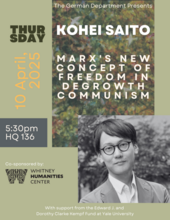Marx’s New Concept of Freedom in Degrowth Communism, with Kohei Saito
In recent years, there have been groundbreaking interpretations of Marx’s theory of freedom. Martin Hägglund’s “democratic socialism” revives the concept of “free disposable time” from The Grundrisse, while Bruno Leipold’s “socialist republicanism” highlights Marx’s consistent defense of freedom as non-domination. Both approaches to conceptualizing post-capitalist freedom are important, but they fall short of updating Marx’s vision of communism adequate to the Anthropocene, as they don’t sufficiently address the sphere of nature. The domination of nature is closely tied to the domination of fellow human beings, making it impossible to separate these spheres, especially in the age of the planetary ecological crisis. Marx endeavored to move beyond his productivist and anthropocentric view of freedom, even in the 1870s. His notion of degrowth communism in the 1880s introduces a different kind of “ecological freedom,” which transcends the capitalistically constituted dualist worldview of society/nature, productive labor/unproductive nature, and freedom/necessity. In this sense, Marx’s degrowth communism is the first attempt to propose an ecological and decolonial vision of freedom, which remained unfinished. It is our task to expand on its implications for the revival of critical theory and the collective survival on our finite planet.
Kohei Saito is Associate Professor of Philosophy at the University of Tokyo. He received his PhD from Humboldt University in Berlin. In 2024/25 Saito is fellow at The New Institute in Hamburg as chair of the program “Beyond Capitalism: War Economy and Democratic Planning.” He works on ecology and political economy from a Marxist perspective. His book Capital in the Anthropocene (Cambridge University Press, 2020) sold more than half a million copies in Japan and has been credited for inspiring a resurgence of interest in Marxist thought in Japan as well as in the USA and Europe.
